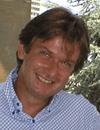Carlo Ventura,
Professor,
University of Bologna
Carlo Ventura is currently Full Professor of Molecular Biology at the School of Medicine of the University of Bologna, Italy. He is the Chief of the Laboratory of Molecular Biology and Stem Cell Engineering of the National Institute of Biostructures and Biosystems (NIBB) in Bologna. Professor Ventura is the Director of the NIBB Division of Bologna, including the NIBB Sections of Firenze, Pisa and Siena. He is also the Chief of the Bioscience Institute (Falciano, Republic of San Marino), a “Good Manufacturing Practice (GMP)” Cell Factory involved in banking and culturing of different types of human adult stem cells. He received his MD, as well as the Ph.D. in Biochemistry and the Specialization in Cardiology, from the University of Bologna. Professor Ventura investigated the molecular mechanisms underlying myocardial cell homeostasis under both normal and pathological conditions. A consistent part of his studies are committed to the analysis of cardiac and vascular differentiation from different stem cell populations, in the attempt of developing innovative strategies maximizing these processes, and stem cell-induced cardiovascular repair. Among its main achievements, he discovered opioid receptors in the myocardial cell and a number of associated signaling patterning that emerged as major controllers of cytosolic Ca2+ and pH homeostasis, and cardiac contractility. He discovered nuclear endorphin receptors and nuclear signaling coupled with cardiac lineage commitment in embryonic stem (ES) cells. After these observations, the term “intracrine” was introduced to identify mechanisms and molecules acting on cell homeostasis from within the nucleus or an intracellular compartment. Professor Ventura discovered natural molecules and synthesized compounds affording a high-throughput of stem cell cardiogenesis and cardiovascular repair in infarcted hearts. Moreover, he found that physical stimuli, including magnetic fields, radiofrequencies, and sound vibrational (nanomechanical) energy, remarkably affected cell behavior, including stem cell commitment and terminal differentiation without the intervention of chemical agonists or viral vector-mediated gene delivery. These findings paved the way to novel approaches in tissue engineering and post-infarct myocardial regeneration. He published more than 100 full papers in the top level Journals of cellular and molecular biology.
|

|
|

 Add to Calendar ▼2012-06-27 17:00:002012-06-27 18:00:00Europe/LondonStem Cell Reprogramming with Chemical Agents and Physical Energy: New Perspectives for Regenerative MedicineSELECTBIOenquiries@selectbiosciences.com
Add to Calendar ▼2012-06-27 17:00:002012-06-27 18:00:00Europe/LondonStem Cell Reprogramming with Chemical Agents and Physical Energy: New Perspectives for Regenerative MedicineSELECTBIOenquiries@selectbiosciences.com Add to Calendar ▼2012-06-27 00:00:002012-06-28 00:00:00Europe/LondonStem CellsSELECTBIOenquiries@selectbiosciences.com
Add to Calendar ▼2012-06-27 00:00:002012-06-28 00:00:00Europe/LondonStem CellsSELECTBIOenquiries@selectbiosciences.com